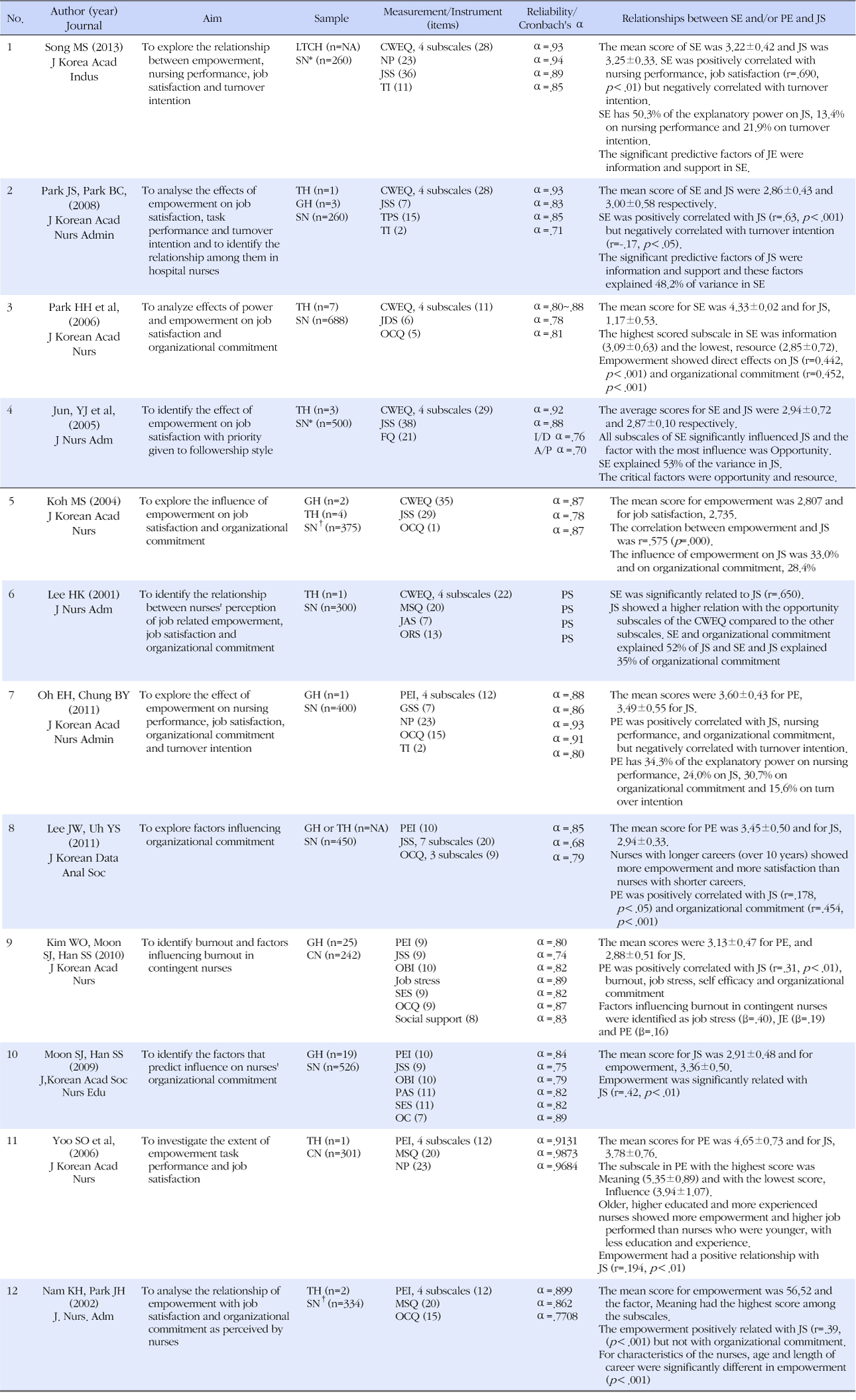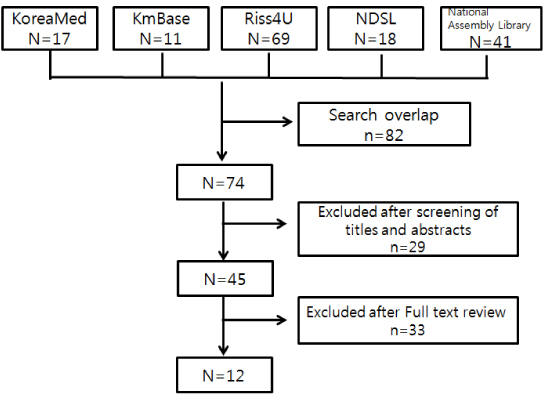Department of Nursing, Woosong University, Korea.
Copyright © 2013 Korean Academy of Nursing Administration
This is an open access article distributed under the terms of the Creative Commons Attribution Non-Commercial License (http://creativecommons.org/licenses/by-nc/3.0/), which permits unrestricted non-commercial use, distribution, and reproduction in any medium, provided the original work is properly cited.


LTCH=Long term care hospital; NA=Not available; SN=Staff nurses; TH=Tertiary hospital; GH=General hospital; CN=Contingent nurses; CWEQ=Conditions for work effectiveness questionnaire; NP=Nursing performance; JSS=Job satisfaction; TI=Turnover intention; OCQ=Organizational commitment questionnaire; MSQ=Minnesota satisfaction questionnaire; JAS=Job Activity Scale; TPS=Task Performance Scale; JDS=Job diagnostic survey; FQ=Followership questionnaire; ORS=Organizational Relationship Scales; GSS=General Satisfaction Scale; PEI=Psychological Empowerment Index; OBI=Oldenburg Burnout Inventory; PAS=Professional Autonomy Scale; SES=Self Efficacy Scales; OC=Organizational commitment; I/D=Independent/dependent; A/P=Active/passive; PS=Previous studies; SE=Structural Empowerment; PE=Psychological empowerment.
*Employed over 6 months; †Employed over 1 year;


Quality Assessment and Validity Tool for Correlational Studies (Adapted from Cummings & Estabrooks, 2003)
DV=Dependent variable; IV=Independent variable.
Summary of Quality Assessment
Relationships between Structural Empowerment/Psychological Empowerment and Job Satisfaction
LTCH=Long term care hospital; NA=Not available; SN=Staff nurses; TH=Tertiary hospital; GH=General hospital; CN=Contingent nurses; CWEQ=Conditions for work effectiveness questionnaire; NP=Nursing performance; JSS=Job satisfaction; TI=Turnover intention; OCQ=Organizational commitment questionnaire; MSQ=Minnesota satisfaction questionnaire; JAS=Job Activity Scale; TPS=Task Performance Scale; JDS=Job diagnostic survey; FQ=Followership questionnaire; ORS=Organizational Relationship Scales; GSS=General Satisfaction Scale; PEI=Psychological Empowerment Index; OBI=Oldenburg Burnout Inventory; PAS=Professional Autonomy Scale; SES=Self Efficacy Scales; OC=Organizational commitment; I/D=Independent/dependent; A/P=Active/passive; PS=Previous studies; SE=Structural Empowerment; PE=Psychological empowerment.
*Employed over 6 months; †Employed over 1 year;
DV=Dependent variable; IV=Independent variable.
LTCH=Long term care hospital; NA=Not available; SN=Staff nurses; TH=Tertiary hospital; GH=General hospital; CN=Contingent nurses; CWEQ=Conditions for work effectiveness questionnaire; NP=Nursing performance; JSS=Job satisfaction; TI=Turnover intention; OCQ=Organizational commitment questionnaire; MSQ=Minnesota satisfaction questionnaire; JAS=Job Activity Scale; TPS=Task Performance Scale; JDS=Job diagnostic survey; FQ=Followership questionnaire; ORS=Organizational Relationship Scales; GSS=General Satisfaction Scale; PEI=Psychological Empowerment Index; OBI=Oldenburg Burnout Inventory; PAS=Professional Autonomy Scale; SES=Self Efficacy Scales; OC=Organizational commitment; I/D=Independent/dependent; A/P=Active/passive; PS=Previous studies; SE=Structural Empowerment; PE=Psychological empowerment. *Employed over 6 months; †Employed over 1 year;